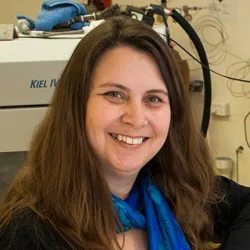
Master of Science in Earth Sciences
Overview
As a student of the Master of Science in Earth Sciences, you’ll delve into the complex systems and processes that shape our planet - and graduate with a prestigious qualification from Australia’s leading university.
This coursework-based program will develop your skills in experimental techniques across Earth science disciplines including: computational geosciences; data sciences; biogeochemistry; experimental petrology; geobiology; geochemistry; geochronology; geology; geophysics; ocean and climate change; and planetary sciences.
In addition, you'll undertake courses designed to broaden your understanding of the role of science in society and industry, and to improve your science communication skills.
Students who are more interested in a research-based program should consider the Master of Earth Sciences (Advanced), also offered by ANU.
Key facts
- #1 in Australia and #12 in the world for Earth & Marine Sciences (QS 2024)
- #1 in Australia and #12 in the world for Geology (QS 2024)
- 2 years full time
- Access to state-of-the-art facilities
- Prior learning recognised
- #1 in Australia for graduate employability (Times Higher Education)
Careers
A Master of Science in Earth Sciences gives you the opportunity to gain a wide range of knowledge and skills that are relevant for employment in industry, government agencies, and education. It is an excellent qualification for pursuing a career in climate and marine science, geochemistry, and geophysics.
The Australian National University has been ranked as the top university for graduate employability in Australia in the Global University Employability Ranking 2023-24. As a student at ANU, you gain access to the ANU CareerHub – an online career development and employability tool that includes a jobs board and careers resources. You also have access to drop-in chats with a career consultant and to attend our career fairs to meet potential employers.
Learning experience
Fees & scholarships
Scholarships
Whether you are looking for financial support to start your studies at ANU or help to move away from home for the first time, we have scholarship opportunities for you and your situation.
Key people

Dr David Heslop, program convenor

Dave's research focuses on Earth's magnetic field. His areas of expertise are geophysics and data science, including the development of new statistical techniques to quantify past changes in the behaviour of Earth's magnetic field. Dave is currently working on a project to reconstruct field behaviour around Australia over the last ten thousand years.

Professor Penny King

Penny examines the interaction of planetary materials with gases and the role of these processes in understanding the evolution of planetary environments and surfaces. Her areas of expertise are Geology, Geochemistry, Surface Processes and Mineralogy and Crystallography.

Professor Nerilie Abram

Nerilie's research focuses on how the Earth’s climate has behaved over the last millennium, and what that tells us about the climate changes we are seeing now. The past climate records that she develops come from corals, caves and ice cores, and she combine these with climate model data to study climate changes.

Professor Andrew Roberts

Andrew's work using geologic and fossil records has enabled scientists to use the geological record to reconstruct global plate tectonic movements and to understand variations in Earth's magnetic field through its history. He is an international leader in the field of environmental magnetic analyses of climate change, and has developed new methods in rock magnetism.
How to apply
Understand the how to apply steps
Visit the international postgraduate applications page to prepare for your application to ANU.
International postgraduate applicationsUnderstand the how to apply steps
Visit the domestic postgraduate applications page to prepare for your application to ANU.
Domestic postgraduate applications




